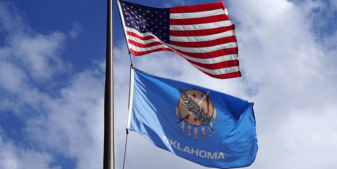Two bills that proposed to legalize sports betting in Oklahoma failed to gather enough votes to make it out of the Senate on Thursday. Both bills fell short by just one vote from progressing.
House Bill 1047 would have required Gov. Kevin Stitt’s signature to be activated, but Stitt had already commented that he intended to veto it. The Governor believed the bill was too heavily in favor of the state’s tribes and did not serve the people. The bill proposed to legalize sports betting through the state’s tribal casinos.
Stitt commented, “None of those bills that have moved off the floors of the House or Senate have got my input on them. As a matter of fact, they’ve excluded the governor of the State of Oklahoma from these discussions. These are tribal-pushed bills that are only going to benefit the tribes and not the citizens of Oklahoma.”
Stitt advocates for a “free market solution” that would open up the possibility for a range of companies to offer sports betting.
House Bill 1101, on the other hand, would have put the issue to the people of Oklahoma in a referendum next year. One of the bill’s sponsors, Sen. Ken Luttrell, believed the people would have approved the bill if given the opportunity to vote.
Luttrell worked with the Oklahoma Indian Gaming Association to draft the bills, which led to Gov. Stitt’s opposition.
Market for sports betting
Luttrell believed that legalizing Oklahoma sports betting could bring in anywhere between $14 million to $42 million in tax revenue. The market is there, but Oklahomans are either betting at neighboring states such as Kansas, Arkansas, and Colorado, or online through VPNs and prediction markets.
Sen. Dave Rader also supported the bill for its potential to bring in money to the state. Rader commented, “If some of our citizens are asking for it and going across the state line to do this, we should do something to keep those dollars in our state.”
Missed opportunity
The bills’ other sponsor, Sen. Bill Coleman, belives the state has missed a big opportunity in the failure to legalize sports betting.
Coleman commented, “I’ve been working on sports betting for years and truly believe Oklahoma is missing out on a significant opportunity—both economically and in terms of consumer protection.”
Despite the failure, the Senator believes legislation will come in time. He stated, “Although the legislation did not move forward this session, the issue is far from dead.”
Coleman blamed poor communication rather than strong opposition for the bills lack of progress. He continued, “The biggest challenge I have noticed through this process has been a lack of communication—no one is sitting down and talking through this.”
He now plans to bring stakeholders together to discuss the matter further and come back with new legislation in the future. He declared, “I’m seriously considering hosting an interim study this summer to bring all stakeholders to the table. If we want a responsible and effective path forward on sports betting, we need to build it together.”
For now, Oklahoma residents will have to continue making trips across the border or use offshore sportsbooks to get their bets on.

